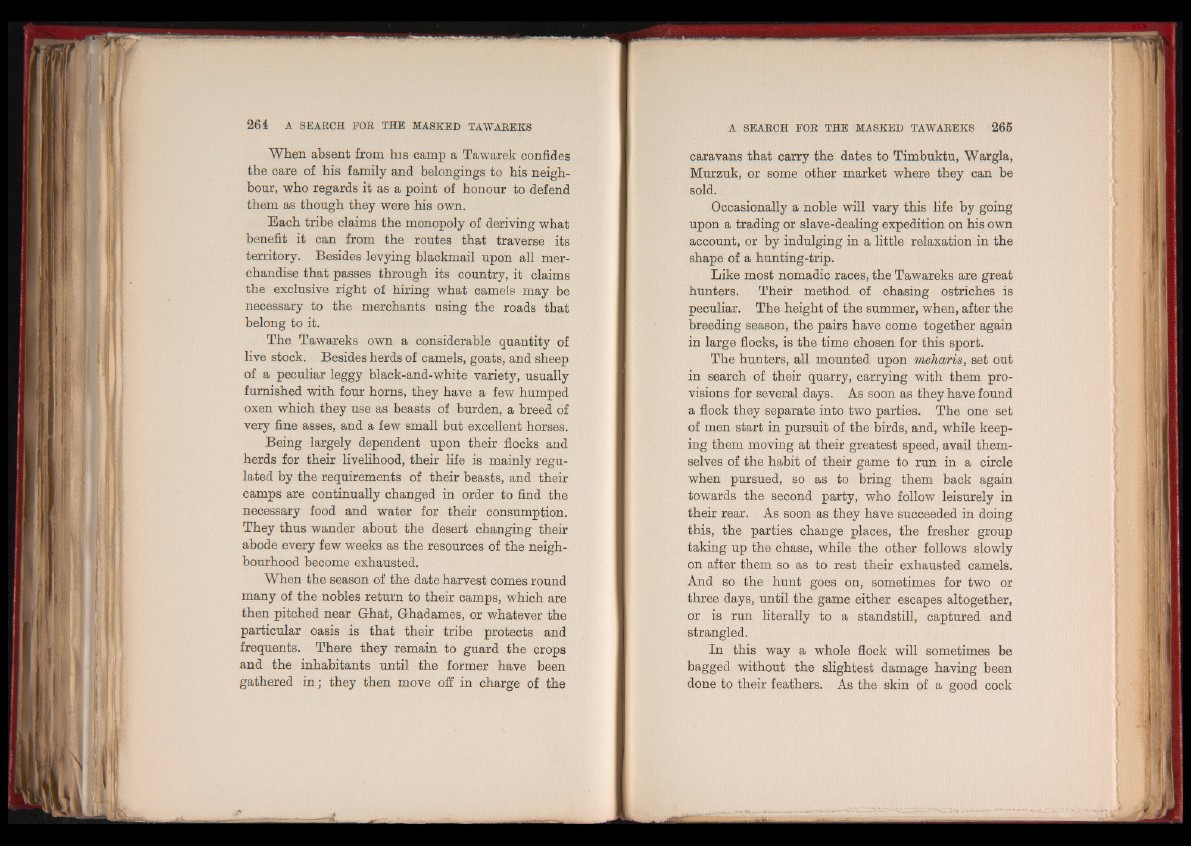
When absent from his camp a Tawarek confides
the care of his family and belongings to his neighbour,
who regards it as a point of honour to defend
them as though they were his own.
Each tribe claims the monopoly of deriving what
benefit it can from the routes that traverse its
territory. Besides levying blackmail upon all merchandise
that passes through its country, it claims
the exclusive right of hiring what camels may be
necessary to the merchants using the roads that
belong to it.
The Tawareks own a considerable quantity of
live stock. Besides herds of camels, goats, and sheep
of a peculiar leggy black-and-white variety, usually
furnished with four horns, they have a few humped
oxen which they use as beasts of burden, a breed of
very fine asses, and a few small but excellent horses.
Being largely dependent upon their flocks and
herds for their livelihood, their life is mainly regulated
by the requirements of their beasts, and their
camps are continually changed in order to find the
necessary food and water for their consumption.
They thus wander about the desert changing their
abode every few weeks as the resources of the neighbourhood
become exhausted.
When the season of the date harvest comes round
many of the nobles return to their camps, which are
then pitched near Ghat, Ghadames, or whatever the
particular oasis is that their tribe protects and
frequents. There they remain to guard the crops
and the inhabitants until the former have been
gathered in; they then move off in charge of the
caravans that carry the dates to Timbuktu, Wargla,
Murzuk, or some other market where they can be
sold. Occasionally a noble will vary this life by going
upon a trading or slave-dealing expedition on his own
account, or by indulging in a little relaxation in the
shape of a hunting-trip.
Like most nomadic races, the Tawareks are great
hunters. Their method of chasing ostriches is
peculiar. The height of the summer, when, after the
breeding season, the pairs have come together again
in large flocks, is the time chosen for this sport.
The hunters, all mounted upon meharis, set out
in search of their quarry, carrying with them provisions
for several days. As soon as they have found
a flock they separate into two parties. The one set
of men start in pursuit of the birds, and, while keeping
them moving at their greatest speed, avail themselves
of the habit of their game to run in a circle
when pursued, so as to bring them back again
towards the second party, who follow leisurely in
their rear. As soon as they have succeeded in doing
this, the parties change places, the fresher group
taking up the chase, while the other follows slowly
on after them so as to rest their exhausted camels.
And so the hunt goes on, sometimes for two or
three days, until the game either escapes altogether,
or is run literally to a standstill, captured and
strangled.
In this way a whole flock will sometimes be
bagged without the slightest damage having been
done to their feathers. As the skin of a good cock